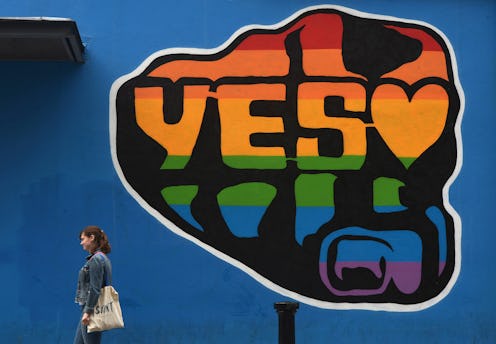News
Ireland's Gay Marriage Activism Gets Colorful
In a landmark move, voters are headed to the ballot Friday to take part in Ireland’s referendum on legalizing same-sex marriage. Having been one of the last western countries to decriminalize homosexuality (in 1993), the Republic of Ireland could now become the first to legalize gay marriage via popular vote. More than 3.2 million people will be asked to approve this statement: “Marriage may be contracted in accordance with law by two persons without distinction as to their sex.” If a majority answer in the affirmative, the constitution will be altered to enshrine gay and lesbian couples’ right to a civil marriage.
Ireland is a Catholic country, and Al Jazeera reports that low-key church leaders have opposed the reform — invoking issues such as parenthood and surrogacy rights for gay couples. But all major political parties have got behind the constitutional change, and polls have indicated that “Yes” votes will outstrip “No” by a margin of almost two-to-one. The voting opened at 7am BST and is set to close at 10pm. The results of the referendum are expected to be released Saturday.
“The stories that I've heard over the last number of years from ordinary people, in ordinary jobs, this burden and pressure that's been on them, living in the shadows — that can be removed on Friday by voting ‘Yes’,” Al Jazeera quotes Prime Minister Enda Kenny as saying in the lead up to the vote. “We are saying here, in a world first, that the people of Ireland can extend the right of civil marriage to all our citizen.”
Previous popular referendums on same-sex marriage in Croatia and Slovenia got negative results, but Slovenia’s parliament went ahead and approved gay marriage regardless. Same-sex marriages are now legal in 19 countries across the world.
The New York Times notes that the lack of major opposition to Ireland’s Friday referendum is surprising, especially given that past referendums on divorce and abortion have proved controversial and schismatic. But, in the wake of a series of scandals (including the abuse of children), the Catholic Church is seemingly losing its conservative grip on the country. Even members of the clergy have come out in support. “I feel that as a country and a church we haven’t treated gay people well,” Reverend Tim Hazelwood, from a rural part of County Cork, told The Irish Times this week, “and I said that at the end of Mass on Sunday, when I said I would be voting ‘yes.’”
Indeed, Ireland seems to be gearing up for one big, joyous coming out party — despite lingering concerns from the country’s conservative heartland. If the only potential stumbling block is, as Al Jazeera suggests, actually ensuring the country’s young people get out and vote, then visual evidence from across the country suggests that the “Yes” campaign needn't worry. Because the country has erupted into a rainbow-colored fiesta of affirmation.
Street artists are joining in the fight, with imaginative wall art promoting "Yes" popping up across Ireland.
This effort, on a castle, is particularly impressive.
Rights groups and activists have furthered the cause with eye-catching signage, and celebrities have been backing up the campaign.
Private businesses and community groups have put window space to work for the cause.
While the transportation industry seems fairly committed as well.
And some individual efforts have been just as excellent, with many Twitter users getting on board with #gettheboat2vote — a campaign calling on eligible citizens to return to Ireland for the referendum.
The hashtag #bemyyes has cropped up across social media, as progressive Irish citizens who can't make it home for the referendum implore the rest of the country to make the change for them.
Images: Getty Images (6)
